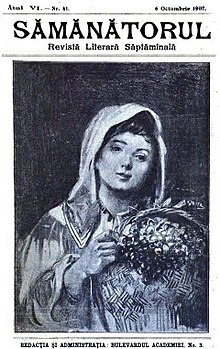Seedorism
The Sämänätorismus ( Romanian Sămănătorism or Semănătorism , literally "Sämannsbewegung" ) mainly from 1901 to about 1910, a patriarchal oriented ideology and literary movement in the Kingdom of Romania . The main representative of the popular-friendly , traditionalist- oriented movement was Nicolae Iorga .
Main features
The movement was triggered by the five-part cycle by Duiliu Zamfirescu “Roman der Comâneşteanus” ( Romanian Romanul Comâneştilor ), the first major epic portrait of Romanian society. Here Zamfirescu pleaded for a patriarchal society and the symbiosis between progressive landowners and farmers. Seedorism then made this its main claim.
At the beginning of the 20th century, a number of Romanian writers grouped around the magazine Sămănătorul ( German "The Sower" ), which was edited by the publisher and historian Nicolae Iorga (1871-1940), and the Viața newspaper, edited by the representative of Poporanism Garabet Ibrăileanu Românească ( German "Romanian life" ) as organs of populist literary theory and literature.
The Seedorism developed under Iorga was shaped by nationally oriented literature that was oriented towards rural life. Poporanism, known as Narodniki in the Russian Empire , was a parallel current influenced by Ibrăileanu, Constantin Stere, and Constantin Dobrogeanu-Gherea . They advocated peasant democracy and demanded that the country's intellectuals look after and represent the interests of the peasants , who made up a majority of 80 percent of the Romanian population.
Iorga turned against the exploitation of the peasants by big landowners, against capitalist trusts and monopolies and the predominance of foreign capital , as well as against "selfish" politicians. He also advocated the maintenance of the Romanian language and Romanian culture anchored in the “pure”, autochthonous , folk tradition . Repeatedly Iorga sharply criticized the cosmopolitan fashions and tendencies in the urban upper classes of the country, which he accused of revealing their national idiosyncrasy with their uncritical reverence for western, especially French cultural models. He criticized the foreign infiltration of the Romanian language of the “noble society” through pronounced borrowings from the French language .
Iorga wanted a revival of Mihai Eminescu's nationalism of the 1870s and 1880s in a new form. The movement called for barriers to shield the Romanian cultural life from foreign influences of a spiritual and civilizational nature. A social mysticism developed which , beyond the movement of Seedorism, encroached upon the intellectual and political generation of 1900 as a whole. The sometimes overheated discussion about the Romanian intellectual life from around 1900 to the First World War was often characterized by nationalism degenerating into chauvinism . This phenomenon was part of a pan-European phenomenon of the time and was given additional impetus by the unsolved Transylvania question .
The works of the poets Ștefan Octavian Iosif (1875–1913), Octavian Goga (1881–1938) and the prose writer Calistrat Hogaș (1847–1919), Ion Alexandru Brătescu (1868–1946), Gala Galaction ( 1879–1946 ) were created in the spirit of this trend. 1961), Ion Agârbiceanu (1882–1963) and Mihail Sadoveanu .
In the peasant uprising in Romania in 1907 , the Romanian peasants protested against their living and working conditions and against what they saw as the unjust distribution of land.
Iorga was Romanian Prime Minister from 1931 to 1932. After differences within the Nationalist People's Party ( Romanian Partidul Naționalist al Poporului ) he founded his Nationalist Democratic Party ( Romanian Partidul Naționalist Democrat ) in 1932 . He was murdered by legionnaires on November 27, 1940 after journalistic attacks on the right-wing extremist Iron Guard .
The countercurrent to Seedorism and Poporanism was Romanian symbolism , led by its theorist Ovid Densusianu (1873–1938). As a member of the educated urban bourgeoisie, he resolutely opposed the pronounced nationalism of the time. Symbolism represented urban civilization and sophistication.
literature
In German language:
- Dietmar Müller: Agrarian populism in Romania: program and government practice of the peasant party and the national peasant party of Romania in the interwar period . Gardez! Verlag, Remscheid 2001, ISBN 3-89796-068-0 .
In Romanian:
- George Călinescu, Al Piru: Istoria literaturii române de la origini și pînă în prezent . Editura Vlad & Vlad, Bucharest 1982.
- Marian Popa: History of Romanian Literature . Publisher Univers, 1980, Chapter X: Poporanism and the Viața Românească .
- Henri H. Stahl: Gânditori și curente de istorie socială românească . Ed. Univ. din Bucureşti, Bucharest 2001, ISBN 973-575-600-5 .
- Henri Zalis: Poporanismul în literatura română . Biblioteca Centrală Universitară din Bucureşti. Sectorul de Documentare Universitară, Bucharest 1972.
- Poporanismul în literatura română. Contribuții bibliografice . Biblioteca Centrală Universitară, Bucharest 1972.
Web links
- Poporanismul - doctrina politica și program cultural . news20.ro (Romanian) accessed on April 12, 2011.
Individual evidence
- ↑ edoc.ub.uni-muenchen.de (PDF; 1.9 MB), Ludwig-Maximilians-Universität München, Georgeta Daniela Oancea: Mythen und Geschichte, Romania nach der Wende , 2005, here p. 35, accessed on 12. April 2011
- ↑ Keno Verseck : Romania (= Beck's series . Volume 868 , issue 3). CH Beck, 2007, ISBN 3-406-55835-6 , pp. 161 .
- ^ Eva Behring: Romanian literary history from the beginnings to the present . Universitätsverlag, Konstanz 1994, ISBN 3-87940-440-2 , p. 177 .
- ^ Poporanismul - doctrina politica și program cultural . news20.ro (Romanian) accessed on April 12, 2011.
- ^ A b Horst G. Klein, Katja Göring: Romanian country studies . Gunter Narr, 1995, ISBN 3-8233-4149-9 , pp. 165, 166 ( books.google.de ).
- ^ Günter Holtus , Edgar Radtke: Romanian Studies in Discussion, Volume 259 of Tuebinger Contributions to Linguistics . Gunter Narr, 1986, ISBN 3-87808-859-0 , p. 21-23 .
- ^ Gustav Ludwig Weigand, Wolfgang Dahmen , Johannes Kramer: Balkan Archive, Volume 3 . JA Barth, 1996, p. 218 .
- ^ Karsten Garscha, Claudius Armbruster, Karin Hopfe: Horizon Shifts . Gunter Narr, 1998, ISBN 3-8233-5188-5 , p. 98 .
